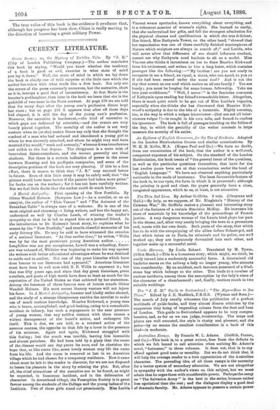A Mortal Antipathy. First opening of the New Portfolio. By
Oliver Wendell Holmes. (Sampson Low.)—As a novelist, or as an essayist, the author of "Elsie Venner " and "The Autocrat of the Breakfast-Table" is always sure of a welcome. He is one of the most original and charming c•f living writers, and has tho happy art, understood so well by Charles Lamb, of winning the reader's sympathy so that he is led to regard him as a personal friend. In the introduction to Dr. Holmes's latest story, he explains what he means by the "New Portfolio," and recalls cheerful memories of his early literary life. Ho may be said to have witnessed the creation of a national literature. "At that earlier time," he writes, " Willis
was by far the most prominent young American author Longfellow was not yet conspicuous, Lowell was a schoolboy, Emer- son was unheard of, Whittier was beginning to make his way against the writers with better educational advantages whom he was destined to outdo and to outlive. Not one of the great histories which have done honour to our literature had appeared." American literature mast have been in evil case with N. P. Willis to represent it ; bat that was fifty years ago, and since that day great historians, great novelists, and poets of high worth have done at least as much for the reputation of the United States as that achieved by her statesmen. Among the foremost of these famous men of letters stands Oliver Wendell Holmes. His most recent literary venture will not injure his fame. In A Mortal Antipathy, humour and kindly satire abound, and the study of a strange idiosyncrasy enables the novelist to make use of much curious knowledge. Maurice Kirkwood, a young man who is brave, accomplished, and good-looking, owing to a remarkable accident in infancy, has such a repugnance to the near presence of young women, that any sadden contact with them causes a violent derangement of the heart's action, and endangers life itself. This is due, we are told, to a reversed action of the nervous centres, the opposite to that felt by a lover in the presence of his mistress. Again and again, Kirkwood struggled with this feeling; bat the result was terrible, leaving him insensible and almost pulseless. He had been told by a gipsy that the cause of the disease would one day prove its cure, and he cherishes the hope that, as like onres like, some lovely woman may lift the curse from his life. And the curse is removed at last in an American village which he had chosen for a tempOrary residence. How it came about must be left to the reader to discover, for we are not disposed to lessen his pleasure in the story by relating the plot. Bat, after all, the chief attractions of the narrative are to be found, as might be expected, in humorous incident, and in the delineation of character. In Arrowhead village, the Pansophian Society is in great favour among the students of the College and the young ladies of the Institute. Two of these girls stand out prominently. Miss Lerida
Vincent wears spectacles, knows everything about everything, and is a vehement asserter of woman's rights. She learned eo easily, that she undervalued her gifts, and felt the strongest admiration for the physical charms and qualifications in which she was deficient. Her friend, Miss Enthymia Tower, on the other hand, "showed that her organisation was one of those carefully finished masterpieces of Nature which sculptors are always in search of;" and Lerida, who will never allow that difference of sex should influence conduct, cannot see why Enthymia need hesitate to sit as a model. Miss Vincent also thinks it incumbent on her to draw Maurice Kirkwood from his retirement, and writes to him a long letter, which contains passages like the following :—" My brother ! are you not ready to recognise in me a friend, an equal, a sister, who can speak to you as if she had been reared under the same roof ? And is not the sky that covers us one roof which makes us all one family ? You are lonely ; you must be longing for some human fellowship. Take me into your confidence." "Well, I never ! " is the feminine comment of Eutbymia upon reading her friend's remarkable letter. Altogether, there is much quiet mirth to be got out of Miss Lerida's vagaries, especially when she thinks she has discovered that Maurice Kirk- wood's antipathy is due to the bite of a tarantula. Highly amusing, too, is the way in which a vulgar interviewer—(bat are not all inter- viewers vulgar ?)—is caught in his own toils, and forced to confess his ignorance. The book is full of passages touching on the follies of the day, in which the geniality of the writer conceals in large measure the severity of hie satire.


































 Previous page
Previous page